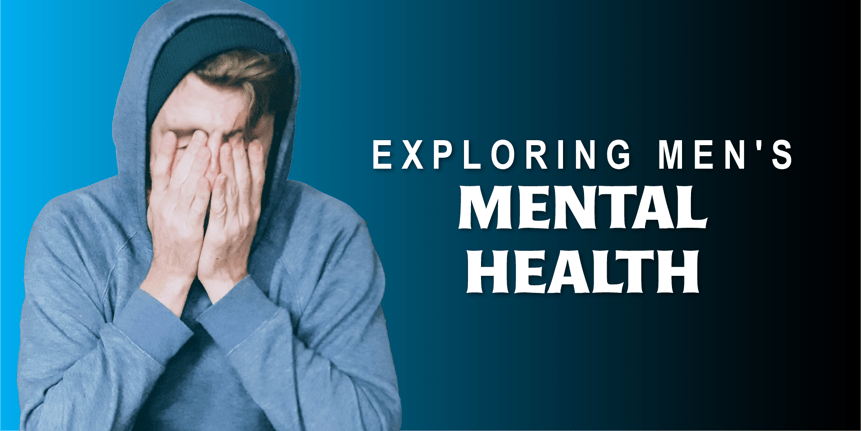Exploring Men's Mental Health
- Category: Health Education, Behavioral Health
- Posted On:

Did you know that men are less likely than women to seek medical help for physical and mental health issues? If you have a man in your life - father, son, brother or spouse - you probably already know this.
According to studies, this reluctance contributes to higher rates of undiagnosed conditions and preventable health problems among men. Breaking the stigma around men's health discussions and encouraging proactive healthcare can lead to better outcomes and longer, healthier lives.
This comprehensive guide provides valuable insights into the various aspects of men's mental health, from understanding male mental disorders to overcoming societal pressures, stigma, and unique challenges faced by men of color, particularly black males and mental health.
Recognizing Male Mental Disorders
Recognizing and understanding mental disorders, including depression and anxiety in men, is crucial for promoting a healthier and more supportive environment. Conditions such as depression, anxiety, and substance abuse are not uncommon among men. Unfortunately, due to societal expectations, men often find it difficult to express their feelings or seek help, leading to men's mental health issues being undiagnosed or untreated.
Signs and symptoms of male mental disorders can range from persistent sadness, irritability, changes in sleep patterns, loss of interest in activities, and difficulty concentrating. This underscores the need for men's mental health awareness, as these symptoms can often be overlooked or misunderstood.
- Persistent feelings of sadness, hopelessness, or emptiness.
- Irritability, anger outbursts, or unexplained mood swings.
- Difficulty concentrating or making decisions.
- Loss of interest in activities once enjoyed.
- Changes in sleep patterns, such as insomnia or oversleeping.
- Fatigue or decreased energy levels, even after rest.
- Increased use of alcohol, drugs, or risky behaviors.
- Withdrawal from social interactions or avoidance of previously enjoyed activities.
- Physical symptoms like headaches, digestive issues, or unexplained aches and pains.
- Thoughts of self-harm, suicide, or feeling like a burden to others.
These signs and symptoms may vary depending on the specific mental health disorder but recognizing them early can lead to timely intervention and support. If you or someone you know is experiencing any of these symptoms, reaching out to a healthcare professional or mental health provider is essential for proper diagnosis and treatment.
The Importance of Seeking Help
Seeking help is an essential part of managing men's mental health issues. It's crucial to challenge societal norms during men's mental health awareness month and beyond, making it less challenging for men to access the resources they need. Reaching out for support, whether it's to a trusted friend, family member, or a mental health professional, is not a sign of weakness, but a testament to one's strength and commitment to self-care.
Watching a loved one struggle with mental health, regardless of gender, can be a challenge. There are many ways to help your loved one without making them feel pressured or "different".
- Normalize the Conversation: Make talking about mental health a regular and accepted topic.
- Highlight Strength: Show that seeking help is a sign of courage and strength.
- Provide Resources: Offer accessible information about support options like hotlines or online therapy.
- Encourage Peer Support: Suggest connecting with friends or support groups who understand.
- Lead by Example: Prioritize your own mental health and share your journey openly.
Breaking the Stigma
The stigma surrounding men accessing mental health resources often prevents them from seeking help due to societal expectations of stoicism and self-reliance. This stigma can perpetuate a cycle of suffering in silence, hindering men from receiving the support and care they need to thrive emotionally and mentally.
According to the Centers of Disease Control and Prevention, suicide rate among men was almost four times higher than woman, a statistic that underscores the urgent need to prioritize men's mental health and break the stigma surrounding it.
Men's mental health awareness initiatives, such as challenging stereotypes and promoting open conversations about mental health can create a supportive environment where men feel comfortable seeking help. Education and awareness play a significant role in this process, helping individuals understand the importance of mental health support without judgment or bias.
The Impact of Cultural and Racial Factors
Black men and men of minority often face unique challenges influenced by cultural and racial factors. Stigma within their communities and cultural norms may discourage them from seeking help, leading to untreated mental health conditions. By promoting men's mental health awareness within these communities and providing culturally sensitive resources, we can break down these barriers and encourage black males to seek the help they need.
At Lake Charles Memorial, we recognize the importance of inclusivity and diversity in mental health support. During men's mental health awareness month and beyond, our comprehensive approach includes providing inclusive and culturally sensitive support to black and minority men and mental health, with a range of resources designed to empower them in their mental health journeys.
Mental Health and Its Impact on Relationships
Studies have shown that untreated mental health disorders in men can significantly impact family dynamics. For instance, according to the American Psychological Association, men with untreated mental health conditions are more likely to experience relationship problems, including conflict, communication breakdowns, and decreased intimacy with their partners. Additionally, children of fathers with untreated mental illness may be at higher risk of emotional and behavioral difficulties, as parental mental health plays a crucial role in shaping family environments and interactions.
Open communication, empathy, and patience are vital in these situations. Encouraging men to seek professional help, offering emotional support, and reminding them they are not alone can significantly contribute to their mental well-being and strengthen family bonds.
At Lake Charles Memorial, we are committed to providing resources and support for men's mental health. Our goal is to foster understanding, break down barriers, and empower men on their mental health journey, especially during men's mental health awareness month.



